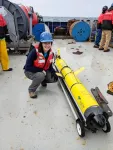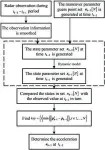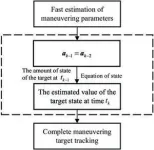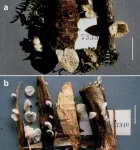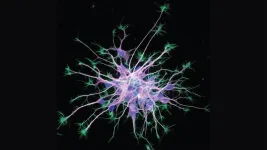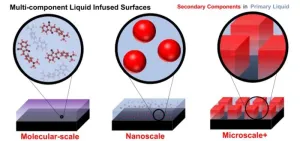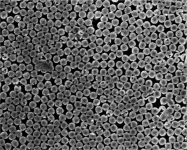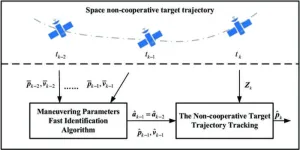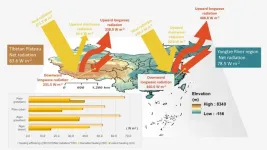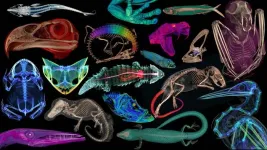(Press-News.org) Chestnut Hill, Mass (03/06/2024) – Boston College Assistant Professor of Earth and Environmental Sciences Hilary Palevsky has been awarded a nearly $1-million National Science Foundation CAREER Award for her work to make remote ocean monitoring data accessible and accurate in real time and produce a series of educational videos to guide students using the data.
Palevsky, whose research focuses on marine biogeochemistry and the mechanisms that enable the ocean to absorb carbon dioxide from the atmosphere, said the funding will allow her to build upon the work she has done to help scientists use the ocean data collected through the NSF-funded Oceans Observatories Initiative.
Another part of her project, titled "Constraining the high-latitude ocean carbon cycle: Leveraging the OOI global arrays as marine biogeochemical time series," involves Palevesky's own research in the “high latitude” ocean, the remote northern and southern waters where the OOI has been collecting year-round data for about a decade, as part of her project.
“I’m very grateful for this award,” said Palevsky, who joined the BC faculty in 2019. “It will make a huge difference and enable me to do the type of work I am really passionate about during the next five years. I appreciate this vote of confidence from the oceanographic community that this work I’ve done in data calibration and quality control is really valued.”
The massive OOI endeavor is described as an ocean observing network “that delivers real-time data from more than 900 instruments to address critical science questions regarding the world's oceans.” Primary goals of the project are to understand natural changes to the oceans, but also the impact of climate change driven by human activity. The data are collected in some of the most remote maritime locations through a variety of sensors. The information is available to researchers, educators, and the general public at any time.
But before that data can be analyzed, they must be “cleaned” or calibrated to account for the many variables at play as measurements are collected from sensors on buoys and submarine devices beneath the ocean’s surface and then fed from remote locations to OOI databases.
Palevsky has spearheaded efforts to create protocols to ensure that researchers and other users can access data of high quality by using a uniform set of calibration standards. Leading a working group for two years, Palevsky and colleagues wrote a 100-page guide for users to ensure data quality control.
The CAREER Award, a signature NSF initiative to support early-career scientists, will fund Palevsky’s further work in this area as well as her own analysis of biogeochemical activity in the oceans, particularly in relation to climate change. The funding will also support one of Palevsky’s graduate students to sail on one of OOI’s month-long research expeditions to the North Atlantic Ocean in order to assist in maintaining remote sensors and gathering data.
With the help of BC’s Center for Digital Innovation in Learning, Palevsky will also produce a series of short videos that will be made available to educators in order to give students far from the ocean a chance to see how the data are gathered.
“Doing this kind of collaborative science and trying to create products that are usable and valuable for people beyond my research group is a chance to respond to something I saw as a need in the broader oceanography community,” Palevsky said.
Palevsky looks forward to using the data in her own research. She hopes to clarify the mechanisms at play when the ocean transfers carbon from near the surface to its lower depths – a process referred to as the ocean’s biological pump.
Professor of Earth and Environmental Sciences and Department Chair Noah Snyder said the CAREER award is fitting recognition of Palevsky’s work as a scientist, teacher, and mentor.
“This is an outstanding accomplishment and reflects the cutting-edge work that Hilary is doing with graduate and undergraduate students in her lab,” Snyder said. “The project is to study the marine carbon cycle in the high latitude ocean, which is a hugely important way that anthropogenic carbon gets removed from active cycling.”
END
For Boston College professor, research into "high latitude" reaches of the seas led to improving accurate access to real-time ocean data
Hilary Palevsky has been awarded a National Science Foundation CAREER Award to support her work on ocean data analysis practices, climate research, and video tutorials for students
2024-03-06
ELSE PRESS RELEASES FROM THIS DATE:
Microbes impact coral bleaching susceptibility, new study shows
2024-03-06
Washington, D.C. – March 6, 2024 – A new study provides insights into the role of microbes and their interaction as drivers of interspecific differences in coral thermal bleaching. The study was published this week in Applied and Environmental Microbiology, a journal of the American Society for Microbiology.
“The diversity, community dynamic and interaction of coral associated microorganisms play important roles in the health state and climate change response pattern of coral reefs,” said lead study author Biao ...
Study: Black boys are less likely to be identified for special education when matched with Black teachers
2024-03-06
WASHINGTON, March 6, 2024—Black male elementary school students matched to Black teachers are less likely to be identified for special education services, according to new research published today. The relationship is strongest for economically disadvantaged students. The study, by Cassandra Hart at the University of California, Davis, and Constance Lindsay at the University of North Carolina at Chapel Hill appeared in the American Educational Research Journal, a peer-reviewed journal of the American Educational Research Association.
The researchers also found that the connection is ...
A new genus of fungi on grasses
2024-03-06
While ecologically important, small mushrooms on monocots (grasses and sedges) are rarely studied and a lack of information about their habitat and DNA sequences creates difficulties in determining their presence or absence in ecological studies and their genetic relationships to other mushroom taxa.
This study led by Drs. Karen W. Hughes and Ronald H. Petersen (University of Tennessee, Knoxville, TN, USA) examined a mushroom species, Campanella subdendrophora, (also known as Tetrapyrgos subdendrophora), which fruits on grasses in the US Pacific Northwest.
The researchers evaluated its phylogenetic position concerning both Campanella and Tetrapyrgos ...
Allen Institute joins the Weill Neurohub
2024-03-06
SEATTLE, WASH.—March 6, 2024—The Allen Institute has officially become the newest member of the Weill Neurohub, a collaborative research network advancing treatments for neurological diseases.
Founded in 2003 by philanthropist Paul G. Allen, the Allen Institute focuses on big questions in biology through a team-based, open science approach, and currently has moonshot projects in neuroscience, cell biology, and immunology institutes.
The new partnership will integrate the Allen Institute’s expertise ...
Revolutionizing surface technology: Introducing multi-component liquid-infused surfaces for adaptive and functional coatings
2024-03-06
Surface coatings have long been essential in various industries, offering protection and functionality. In recent years, liquid-infused surfaces (LIS) have emerged as a groundbreaking technology, revolutionizing how we approach surface coatings. In a review article recently published in Industrial Chemistry & Materials on Feb. 23, 2024, authors Zachary Applebee and Dr. Caitlin Howell explore a novel approach in surface technology that could significantly impact various industries, including healthcare and environmental conservation. A new frontier is emerging: multi-component ...
Nanodevices can produce energy from evaporating tap or seawater
2024-03-06
Evaporation is a natural process so ubiquitous that most of us take it for granted. In fact, roughly half of the solar energy that reaches the earth drives evaporative processes. Since 2017, researchers have been working to harness the energy potential of evaporation via the hydrovoltaic (HV) effect, which allows electricity to be harvested when fluid is passed over the charged surface of a nanoscale device. Evaporation establishes a continuous flow within nanochannels inside these devices, which act as passive pumping mechanisms. This effect is also seen in the microcapillaries of plants, where ...
Scientist proposed a research on space noncooperative target trajectory tracking based on maneuvering parameter estimation
2024-03-06
Firstly, the authors briefly describe two models for tracking the maneuvering trajectories of non-cooperative space targets: the relative dynamics model and the indirect measurement model. In the relative dynamics model, tracking the maneuvering trajectory of the target is modeled as a problem of tracking the target's position over short discrete time intervals. On the other hand, the indirect measurement model transforms radar-derived values directly into measurements in the Local Vertical Local Horizontal (LVLH) coordinate system.
Next, the authors address the tracking problem of targets ...
Scientists uncover comparable net radiation between the high-elevation Tibetan Plateau and the low-elevation Yangtze River region
2024-03-06
Land–atmosphere interactions play a crucial role in shaping Earth’s climate system, profoundly influencing weather patterns, climate variables, and ecological processes. Despite being located at similar latitude, the Tibetan Plateau (TP) and Yangtze River region (YRR) represent two distinct climate zones, garnering significant attention in this field. The former, situated in western China at an altitude exceeding 4000 m, is characterized by an arid climate, whereas the latter, located in the eastern Chinese plain, experiences a humid climate. Although both the TP and YRR have ...
Why some RNA drugs work better than others
2024-03-06
Spinal muscular atrophy, or SMA, is the leading genetic cause of infant death. Less than a decade ago, Cold Spring Harbor Laboratory (CSHL) Professor Adrian Krainer showed this brutal disease can be treated by tweaking a process called RNA splicing. This breakthrough resulted in Spinraza, the first effective treatment for SMA. It also opened a new frontier in drug development. Now, CSHL research could push RNA-splicing drugs even further. CSHL Associate Professor Justin Kinney, Krainer, and postdoc Yuma Ishigami have ...
Scientists-CT scanned thousands of natural history specimens, which you can access for free
2024-03-06
Read the online version (Available 8:00 a.m. ET, March 6, 2024)
Watch the video (Embargoed. Do not distribute before 8:00 a.m. ET, March 6, 2024)
Natural history museums have entered a new stage of scientific discovery and accessibility with the completion of openVertebrate (oVert), a five-year collaborative project among 18 institutions to create 3D reconstructions of vertebrate specimens and make them freely available online.
Researchers published a summary of the project in the journal BioScience in which they review the specimens that have been scanned to date and offer a glimpse of how the data might be used to ask new questions ...
LAST 30 PRESS RELEASES:
Novel camel antimicrobial peptides show promise against drug-resistant bacteria
Scientists discover why we know when to stop scratching an itch
A hidden reason inner ear cells die – and what it means for preventing hearing loss
Researchers discover how tuberculosis bacteria use a “stealth” mechanism to evade the immune system
New microscopy technique lets scientists see cells in unprecedented detail and color
Sometimes less is more: Scientists rethink how to pack medicine into tiny delivery capsules
Scientists build low-cost microscope to study living cells in zero gravity
The Biophysical Journal names Denis V. Titov the 2025 Paper of the Year-Early Career Investigator awardee
Scientists show how your body senses cold—and why menthol feels cool
Scientists deliver new molecule for getting DNA into cells
Study reveals insights about brain regions linked to OCD, informing potential treatments
Does ocean saltiness influence El Niño?
2026 Young Investigators: ONR celebrates new talent tackling warfighter challenges
Genetics help explain who gets the ‘telltale tingle’ from music, art and literature
Many Americans misunderstand medical aid in dying laws
Researchers publish landmark infectious disease study in ‘Science’
New NSF award supports innovative role-playing game approach to strengthening research security in academia
Kumar named to ACMA Emerging Leaders Program for 2026
AI language models could transform aquatic environmental risk assessment
New isotope tools reveal hidden pathways reshaping the global nitrogen cycle
Study reveals how antibiotic structure controls removal from water using biochar
Why chronic pain lasts longer in women: Immune cells offer clues
Toxic exposure creates epigenetic disease risk over 20 generations
More time spent on social media linked to steroid use intentions among boys and men
New study suggests a “kick it while it’s down” approach to cancer treatment could improve cure rates
Milken Institute, Ann Theodore Foundation launch new grant to support clinical trial for potential sarcoidosis treatment
New strategies boost effectiveness of CAR-NK therapy against cancer
Study: Adolescent cannabis use linked to doubling risk of psychotic and bipolar disorders
Invisible harms: drug-related deaths spike after hurricanes and tropical storms
Adolescent cannabis use and risk of psychotic, bipolar, depressive, and anxiety disorders
[Press-News.org] For Boston College professor, research into "high latitude" reaches of the seas led to improving accurate access to real-time ocean dataHilary Palevsky has been awarded a National Science Foundation CAREER Award to support her work on ocean data analysis practices, climate research, and video tutorials for students
